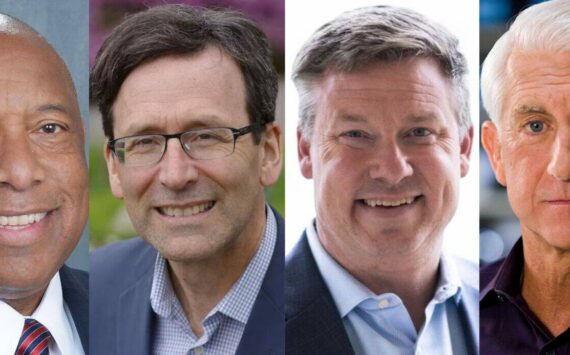Around 9 p.m. on election night, as the tables began to turn, and Washington state Democrats began to seriously doubt their certainty of a Madame President, Attorney General Bob Ferguson got up to the podium. He and other officials at the Democrats’ November 8 gathering at the Westin in Seattle weren’t ready to fully concede — not yet. But Ferguson assured the room, with some gravitas, that “if the truly unthinkable were to happen, I want to tell you who the most important officials in the country are: Your Democratic attorneys general. We can hold your elected officials accountable to the rule of law.”
Today, considering that the unthinkable did happen, he stands true to that promise. Ferguson and many other Democratic attorneys general across the country have made a number of public statements to support that idea: They say they can — and will — take an outsized role in the efforts to protect civil liberties, environmental regulation, and many other federal policies perceived to be under threat by the incoming Donald Trump administration. Pennsylvania attorney general Josh Shapiro, for instance, told the New York Times that he turned down the opportunity to run for U.S. Senate in favor of the AG position because “I believe it to be the most impactful job in government today.”
Ferguson agrees. “I believe that to be true,” he says. “Just look at the dysfunction of Congress. Getting things done in government today is not easy. And that’s an understatement. Attorneys general have tremendous freedom, and the ability to right wrongs. Frankly, that’s what I love about the job.”
Democratic attorneys general have certainly been agitating since November 8. They’ve noted their ability to defend civil rights — such as if the new administration makes good on Trump’s vague and volatile promise to create some kind of Muslim registry. (“Yes,” Ferguson says, very firmly, when asked if he would work to fight a move like that.) Massachusetts attorney general Maura Healey — currently heading a fraud investigation against ExxonMobil for knowingly selling products that contribute to climate change — has vowed that she “won’t hesitate to take Donald Trump to court if he carries out his unconstitutional campaign promises.” Incoming California attorney general Xavier Becerra has said he’s prepared to protect his state’s policies on immigration, health care, energy, and criminal justice — and almost dared the the new federal government to “come at us” with threats to those policies.
And 15 Democratic attorneys general, including Ferguson, signed a letter on December 28 urging the new administration to continue to defend President Obama’s Clean Power Plan. Trump has repeatedly said he’d dismantle the plan, which has been under legal fire from a dozen Republican attorneys general since 2014 — including Oklahoma attorney general Scott Pruitt, the man Trump nominated to lead the Environmental Protection Agency. The Democratic AGs who signed the Dec. 28 letter have all been involved in defending the federal government in that lawsuit.
Ferguson says that although launching any new suit against the feds requires time and resources — his office is already involved in a massive lawsuit against the Obama administration over worker safety issues at the Hanford Nuclear Reservation — it is a topic he’s actively discussing right now, both with his colleagues in other states and internally with his staff. The top three priorities that come to mind for him are civil rights, climate change, and marijuana legalization (strongly opposed by incoming U.S. attorney general Jeff Sessions, who had his confirmation hearing last week; his noncommital statements during the hearing offer some comfort to marijuana advocates, but the future remains unclear).
Should any of the above be challenged, Ferguson is ready. “It’s a non-exclusive list,” he says, but those are “examples of the types of issues I will be looking at very closely. … From my perspective, what matters is whether a [federal] administration, Democratic or Republican, is violating the law in a way that damages the rights of Washingtonians. If that happens — regardless of who’s president — I’m interested in what I can do to prevent that.”
The tactic of taking the federal government to court when state AGs believe it has overstepped its bounds is not a new idea, of course. The number of lawsuits that Republican attorneys general launched against Obama during his tenure is both enormous and unprecedented. Former Texas attorney general Greg Abott alone brought 44 separate lawsuits against the Obama administration, including various challenges to Obamacare, EPA regulations, and the Federal Energy Regulatory Commission; he famously told a Tea Party gathering in 2013 that he saw that as his job. “I go into the office, I sue the federal government, and I go home,” he’s reported to have said.
So now, the question is, “is the shoe on the other foot?” says Ferguson. The country is watching what Democratic attorneys general will do in turn. But given the circumstances, Ferguson believes that their pursuit of legal action against Trump’s agenda is inevitable and that they will coordinate their efforts to do so.
He adds that his office only created a civil rights division a few years ago, under his watch. “I have an intense interest in civil rights issues,” he says — and now has a team of five civil rights attorneys to prove it. “It’s absolutely fair to say that if the [Trump] administration goes in a direction that violates the civil rights of Washingtonians, I will have something to say about that.”
He takes care to confirm his statement on November 8, too. “When I say it’s attorneys general — Democratic attorneys general specifically — who are in many respects the first line of defense against the Trump administration, I mean that,” he says. “I mean that.”








